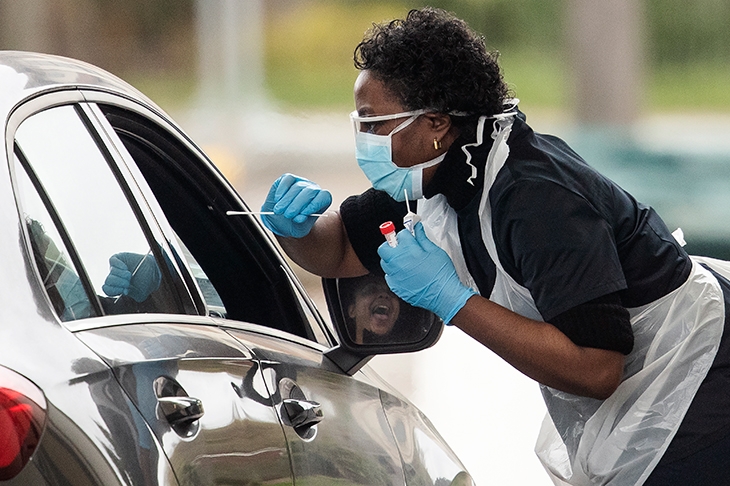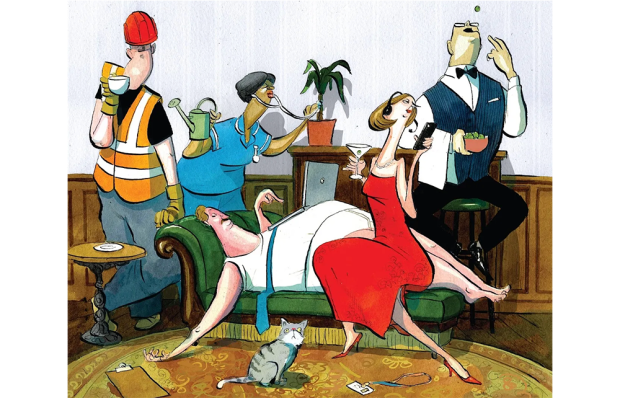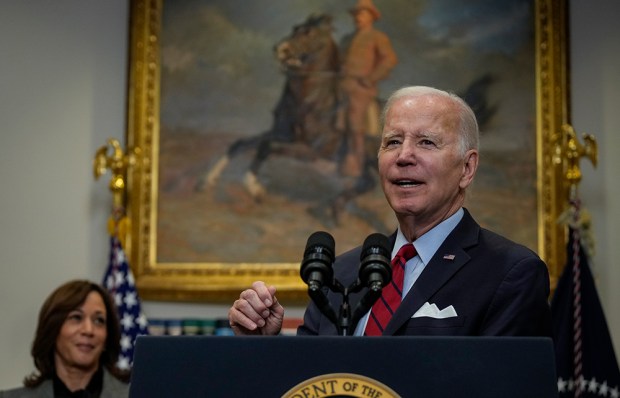The government is bracing itself for a second wave of coronavirus. Everyone knew the autumn and winter would be more difficult than July and August. But what is depressing ministers is how new restrictions have had to be imposed before the summer is even out. ‘It is going to be a long, hard autumn,’ warns one minister intimately involved in this effort.
In many ways this country is better prepared for a second wave than it was for the first. Policy-makers know more about the virus and how it spreads, doctors are better prepared to treat it, the government is better organised than it was before, has better data and significantly more testing capacity. In Whitehall, they expect these changes to be put to the test very soon. ‘The good news is that we have built an early warning system. The bad news is that it is going off,’ is how one figure in Downing Street sums up the situation.
Politically, though, a second wave will be much more difficult for the government. With the first wave, there was a rally-round-the-flag effect. The government’s approval rating shot up to over 50 per cent, the Tories had a 20-point lead in the polls and there was huge goodwill towards Boris Johnson when he ended up in hospital. Voters were forgiving of government mistakes; there was a mature acceptance that errors were bound to be made in handling a new virus about which so little was known. The public obeyed the Prime Minister’s instructions with more intensity than Whitehall modellers had expected. The government and the Bank of England had enough room for manoeuvre to deploy massive amounts of fire power to stave off financial collapse and insulate voters from the worst economic effects of the pandemic. There was also a great sense of national solidarity, exemplified by that Thursday night clapping.
Everything will be more difficult this time round. If a second wave strikes, there won’t be the same rallying response. Instead, far more pointed questions will be asked about government preparedness. Voters will expect the government to be ready in a way they simply did not last time around. An early example of this is the growing row over testing. This country has the ability to test far more people than it did back in March. But there is growing anger about how many people in coronavirus hotspots are being told either that there are no tests available or are being sent long distances for their swab. The situation in Greater Manchester is so bad that even Lindsay Hoyle, the Speaker of the House of Commons — who is constitutionally obliged to stay above the political fray — is publicly complaining about it.
Public irritation will only grow as children can’t attend school and people can’t go to work because they can’t get a test. Governments are always most vulnerable when a policy problem directly impacts voters, and this one will.
In mitigation, allies of the Health Secretary point out that the decision to offer around 100,000 tests a day to care homes inevitably means the rest of the system is under pressure. But as with exam results, the government has failed to learn from Scotland’s mistakes. When schools returned north of the border, there was a rapid run on testing. On 25 August, Nicola Sturgeon appealed to people only to get themselves or their children tested if they had a new persistent cough, a fever or loss of taste and smell rather than just the normal beginning-of-term sniffles. The Westminster government should have seen what was happening in Scotland and done everything it could to increase testing capacity before schools returned. Hancock’s success in hitting the government’s 100,000 tests-a-day target in April shows that capacity can be increased at speed.
Given that one in five of the population of England is either at school or university or works in one of these settings, it is unsurprising that there has been a spike in demand for testing. But the fact it has caused such problems for the system is not an encouraging sign for the winter ahead.
The next challenge is voter tolerance for the restrictions the state believes are needed to control the spread of the virus. The public are still remarkably happy to have their freedoms curtailed to try to slow the spread: more than 60 per cent of voters favour a 10 p.m. curfew. But the danger for the government, as one weary secretary of state puts it, is that ‘the libertarian chunk of the population is disproportionately represented in the Tory party and the press’.
Compounding this problem is that so much of the Prime Minister’s own support comes from this Merry England sensibility, meaning they are particularly cross about him imposing restrictions. One can just imagine what Boris the Telegraph columnist would have made of Covid marshals or what his Spectator would have said about ministers urging the public to inform on neighbours who have more than five guests over.
An even more difficult issue for the government is that, having spent huge amounts of money on the furlough scheme and the broader Covid response during the first lockdown, pushing the national debt to over 100 per cent of GDP in the process, it is more constrained in its options now. As the French Prime Minister has admitted, any state would find it difficult to cope with the financial consequences of a second total lockdown. So economic life will have to continue alongside measures to fight the virus. This will require the government to pull off the most delicate of balancing acts.
Johnson warned a friend recently: ‘Wait for the autumn if you think people are restless now.’ He is desperate to have some normality back before 25 December. For this most cavalier of politicians, being the first leader since Cromwell to cancel Christmas would be too much. But there is growing pessimism in Whitehall that either a vaccine or the ‘moonshot’ testing programme will be in place by then.
Of course, no one can know for sure what will happen with the virus between now and then. But it is hard to see how it will not dominate British politics this autumn. Every issue, including how far the government should go for a Brexit trade deal, will end up being seen through the prism of the pandemic. This will be the corona winter.
Got something to add? Join the discussion and comment below.
Get 10 issues for just $10
Subscribe to The Spectator Australia today for the next 10 magazine issues, plus full online access, for just $10.
You might disagree with half of it, but you’ll enjoy reading all of it. Try your first month for free, then just $2 a week for the remainder of your first year.















Comments
Don't miss out
Join the conversation with other Spectator Australia readers. Subscribe to leave a comment.
SUBSCRIBEAlready a subscriber? Log in